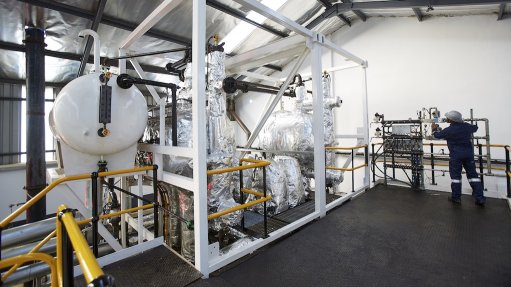
IMPROVING ROADS The new multistage bitumen converter enables SprayPave to enhance the penetration grades of bitumen required to produce asphalt
Manufacturer and supplier of bitumen, modified binders and emulsions for road construction SprayPave has acquired new technology that will enable it to resolve the shortage of high-grade bitumen for asphalt production.
Bitumen is an essential component of asphalt as a binder. It is produced by refineries as a by-product of crude oil, but can only be supplied in broad grade ranges that seldom meet asphalt design specifications.
The new multistage bitumen converter changes bituminous products from one grade to another, enabling SprayPave to enhance the penetration grades of bitumen required to produce asphalt. The 20 t/h multistage bitumen converter was acquired from Technix Industries, in New Zealand, a company that has been in the bitumen business for more than 100 years.
The unit, located at SprayPave’s Cape Town plant, is the second in the world to be commissioned after a similar unit in the South Pacific island of Fiji.
SprayPave GM Eddie Jansen van Vuuren says the company can now achieve predictable and repeatable conversion of penetration-grade bitumen available from South African refineries to grades that are lower in penetration and higher in softening point than feedstock bitumen.
Following several months of testing, the company has received test results back from the South African Bureau of Standards, which show that a bitumen composition of 50/70 produced conforms to the SANS 4001-BT1 specification.
The multistage bitumen converter uses pressure, heat and air to precisely convert bituminous refinery feedstocks into superior-quality bitumen. The softness, penetration index and physical properties of the bitumen can be changed to meet exact design specifications.
He points out that this technology addresses current and future bitumen supply issues in South Africa, particularly in regions, such as the Western Cape, where refineries are unable to provide suitable penetration grades of bitumen for road binders. The converter can modify 70/100 penetration-grade bitumen to 50/70 or even 10/20, which is required for new high modulus asphalt designs.
With certain chemical additives, the converter can also produce multigrade bitumen with specifications and performance characteristics spanning several penetration grades. “This is particularly significant, as it will help manufacturers to comply with the new performance-grade bitumen specifications in South Africa, says Jansen van Vuuren.
These specifications aim to improve the assessment of deformation resistance, fatigue properties, long-term performance and cracking potential of bitumen as an asphalt binder.
By enhancing bitumen penetration grades, the multistage bitumen converter can help asphalt producers ensure that they are using multigrade bitumen products which comply with performance-grade specifications.